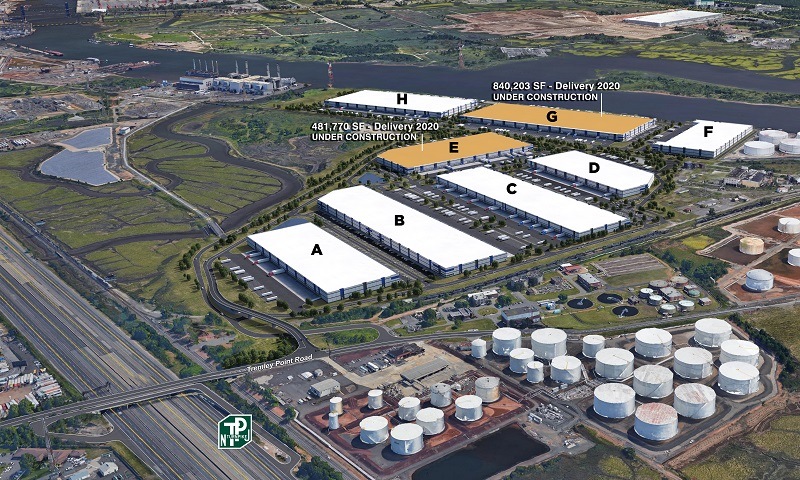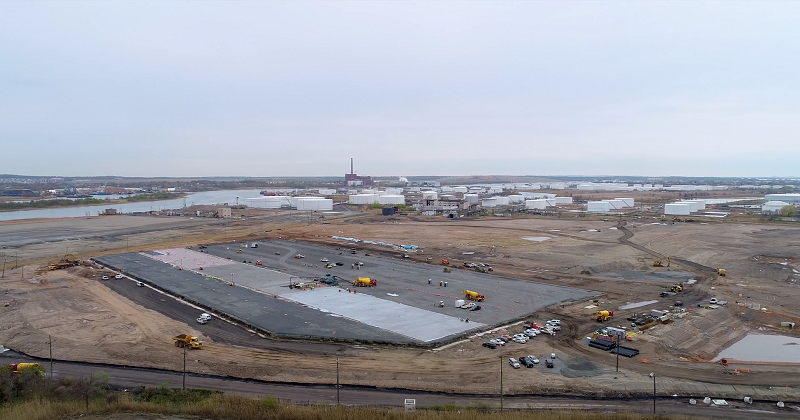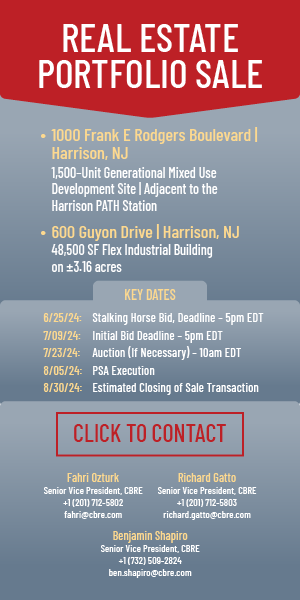A recent virtual open house for the Linden Logistics Center, a planned eight-building, 4.1 million-square-foot industrial complex in Linden, featured a drone flyover video. — Courtesy: Advance Realty Investors/Greek Development
By Joshua Burd
With two pad-ready construction sites, a development team was eager to showcase the milestone at the future site of the eight-building, 4.1 million-square-foot Linden Logistics Center.
There was just one problem: It was mid-May — two months into New Jersey’s coronavirus outbreak and statewide stay-at-home order.

“We were struggling with how to communicate the progress on our site in the midst of everyone working from home,” said David Greek, the acquisitions director with Greek Development, a partner in the project alongside Advance Realty Investors and PGIM Real Estate.
“It was really going through a phase in the construction where we thought it was important for the brokerage community to actually physically, visually witness the progress that we were making on our two spec buildings,” Greek added. “And because nobody is driving down the Turnpike and brokers aren’t doing drive-bys or tours with clients, we were struggling with how to effectively communicate that.”
The developers, along with their leasing team with CBRE, found a solution in a platform that has become ubiquitous during the pandemic. Using Zoom, the project team on May 12 welcomed dozens of brokers to a virtual open house for the site, complete with a construction update, aerial drone footage and a networking session for those on the call.
The program was critical to showcasing the activity at the 350-acre property, especially for a site that lay dormant for decades and required a lengthy environmental cleanup.

“This is a site that has been there for so long and many others have tried and not made it to this point,” Bill Bumber, Advance’s managing director of industrial development said in a May 22 interview. “Here we are getting that message out and, at the end of the day, we appealed to the masses during a time where you can’t be out touring our site.”
Gov. Phil Murphy has since lifted New Jersey’s stay-at-home order, but the state continues to be under social distancing guidelines and strict limits on indoor gatherings. That means other developers and leasing teams may still turn to virtual meetings to maintain interest at large-scale properties, while allowing the brokerage community to stay connected.
Linden Logistics Center Virtual Fly Over from Advance Realty on Vimeo.
At the Linden Logistics Center, which is just east of the New Jersey Turnpike, the first two speculative buildings will total more than 1.3 million square feet. At the smaller of the two, a roughly 480,000-square-foot building, crews were set to begin hoisting tilt-up walls around late May. At the second building, which will span some 840,000 square feet, workers at the time were preparing to pour the structure’s concrete floor.
Last month’s virtual open house drew some 50 brokers who handle many of the market’s significant tenant requirements, according to the project team. One key to the program’s success was the use of a sleek drone flyover, which was shot on a day that crews were completing the concrete floor slabs for one of the two buildings.

Greek and Advance plan to launch other phases of the Linden Logistics Center after leasing the first two buildings. The developers and their leasing team believe they’ve only helped their prospects with the Zoom event, which has seemingly spurred an uptick in requirements and new buzz about the site.
“I think when people know that there’s a date certain and a timeline because it’s under construction, it garners more attention,” said Mindy Lissner, an executive vice president with CBRE and member of the leasing team. She added: “The more they see, the more impactful it’s going to be to somebody with a real requirement.”
For an industry that thrives on networking, the May 12 event also provided a much-needed outlet for many of the state’s top industrial brokers. Bill Waxman, who leads the leasing team alongside Lissner, said at the time that CBRE was considering virtual events for other large projects in the state.

“It is a business of relationships, and we all need to stick together and keep ourselves sharp about what’s going on in the market by collaborating and sharing information,” said Waxman, an executive vice president with CBRE. “So in my mind, it was a lot of fun to host and I think it was very successful. We got a lot of positive feedback from our friendly competition.”
Bumber noted that Advance and Greek are also building out the infrastructure at the site and expect to complete work such as mass grading and utilities across the entire property by midyear 2021. That comes as the project draws inquiries from e-commerce companies and other thriving industrial users in the market.
The team is also fielding interest from cold storage users, which Greek said were active even before the pandemic and have remained so throughout the crisis. That’s not to mention other nontraditional industrial uses such as movie production studios and barging operations, which are attracted to the site’s waterfront access.
“We’ve also been able to engage with some requirements that don’t necessarily fit within the approved plan,” Greek said. “Because this is a large plot of contiguous land, it’s pretty unique in this submarket to have that amount of flexibility to reconfigure buildings, create space for additional parking or create extra building area for a user that needs it.”

Experts say the pandemic and statewide shutdowns have changed consumer habits in a way that will only benefit the industrial sector in the long run. Greek said many of the firm’s tenants “are experiencing historic levels of demand right now, especially those in the e-commerce space, so we totally expect those trends to continue and this crisis will likely accelerate those trends in a big way.”
“A lot of what we’re seeing throughout this crisis really underpins a story we’ve been telling for a long time — that e-commerce is a game-changer for industrial,” he said. “It changes the way that our tenants look at their space, look at the pricing of their space and look at the location of their warehousing and logistics. This crisis has put all of those theories into reality for a lot of our tenants, so the need for industrial space will likely increase once we go back to a normal environment.”
Bumber agreed, adding that the disruption to global supply chains has made e-commerce companies and other users more focused on storing inventory domestically. That will be crucial to responding to consumer demand, especially now that the pool of online shoppers has grown.
“There are consumers who have made a shift to e-commerce who, prior to COVID, might have been hesitant to do so, but now they’ve done it,” Bumber said. “They’ve realized it’s OK and they’ve embraced it.
“Will they go back to the traditional retail model? Sure, but I would say they’re absolutely going to consume a higher percentage via e-commerce, online fulfillment and those types of services, which I think speaks well for us.”










